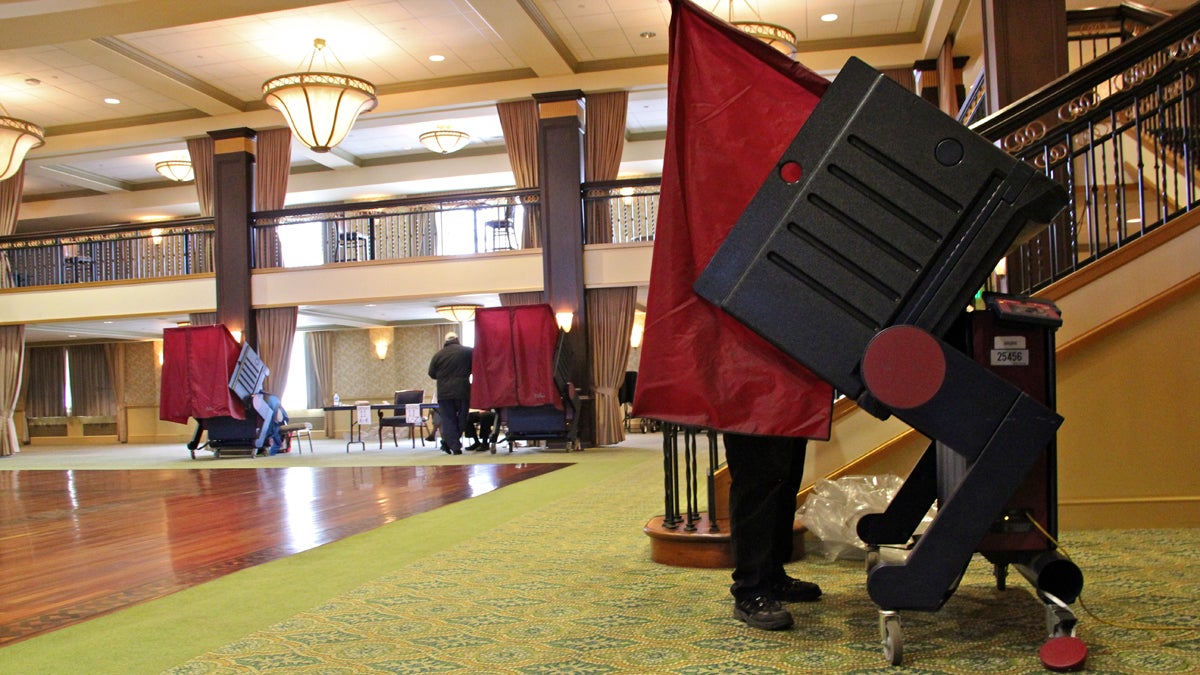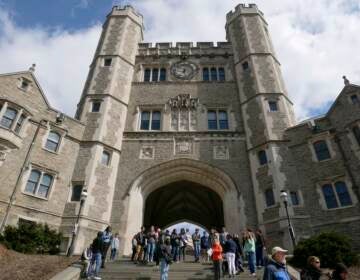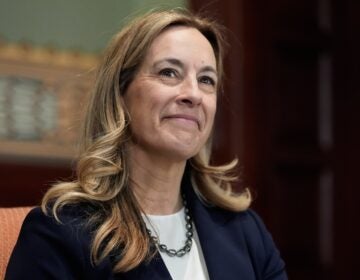Gov. Christie vetoes bill aimed at making voting more convenient

(Emma Lee/WHYY, file)
Roughly two in 10 New Jersey voters participated in an election last week that saw all 80 state Assembly seats on the ballot, one of the poorest voter turnouts in state history. But Monday, Gov. Chris Christie vetoed legislation sent to him over the summer that sought to improve voter participation by making sweeping changes to the state’s election laws.
Christie, a Republican, painted the proposals put forward by Democrats who control the state Legislature — including expanded early voting and automatic voter-registration — as attempts by the Democrats to create a bigger political advantage in New Jersey.
Right now, Democrats maintain an edge of nearly 700,000 registered voters over Republicans. He said the state’s current election system is reliable and cost-efficient.
“Instead of playing politics with the state’s electoral system, the sponsors should work across the aisle on responsible and cost-effective electoral reform,” Christie said in a statement that accompanied his veto.
But Democratic sponsors of the legislation and groups that have been pushing for electoral reform in New Jersey roundly criticized Christie’s action, saying it seemed to have more to do with his interests as a 2016 GOP presidential hopeful than what’s best for New Jersey elections. And they predicted the issue could ultimately end up before voters in the form of a 2016 ballot question.
“I think it just shows that when you put politics before policy, it’s not the right thing,” said New Jersey Assembly Speaker Vincent Prieto (D-Hudson). “And I think it’s all about people being able to vote, and I think this was just a common sense bill that we put forward.”
Christie’s veto of the voting-reform bill, dubbed the “Democracy Act,” was one of dozens of actions on legislation announced this week as he took a break from campaigning for the presidential nomination to tend to matters in the state house.
A backlog of bills on Christie’s desk had been created over the summer after lawmakers rushed to approve legislation in late June before taking a long break in the run-up to last week’s full Assembly election. A quorum held in the Assembly Monday triggered a deadline for gubernatorial action on bills.
The voting-reform bill that lawmakers sent to Christie at the end of June looked to increase voter participation by making it easier for voters to cast ballots and by streamlining the way residents can register to vote.
The more-than 70-page bill proposed providing more hours and locations for early voting; utilizing more technology to help overseas military personnel cast their ballots; permitting online voter registration; and expanding free vote-by-mail services.
It also would have set up automatic voter registration when a state-issued driver’s license is obtained; allowed same-day voter registration for general elections; and permitted 17-year-olds to register to vote in anticipation of their 18th birthday if the next election will occur on or after that birthday.
The bill would have also included language to tighten up handicapped-accessible polling locations; expanded non-English voter-registration and voting accommodations; and strengthened anti-voter fraud protections.
And on the issue of filling U.S. Senate vacancies, the Democrat’s “Democracy Act” bill also sought to eliminate the need for special elections like the one held in October 2013 to fill the seat of the late U.S. Sen. Frank Lautenberg by requiring any office vacant for more than 70 days before the next election to be filled during that election. The governor would have maintained the right to appoint someone to fill a U.S. Senate seat temporarily, but the replacement would have to come from the same political party as the senator who previously held the seat. Christie in 2013 picked Republican Jeff Chiesa to temporarily fill the seat.
In his rejection of the bill Monday, Christie said the changes to New Jersey’s voting laws could have added as much as $25 million in additional spending on elections. That’s nearly the same amount that it cost to hold the special U.S. Senate primary and general elections in 2013. Many Democrats suspected at the time that Christie was afraid to be on the ballot with Democrat Cory Booker, the contest’s eventual winner, because the governor was seeking a blowout win against then- Democratic state Sen. Barbara Buono in the gubernatorial race to bolster his presidential ambitions. Christie said that efforts to increase vote-by-mail in New Jersey and the shifting of many school board elections to November have improved a state voting system that he said is already reliable and cost-effective.
“Tellingly, the bill lacks the support of the bipartisan group of county election officials who would be responsible for its implementation and administration,” Christie said in the statement.
But Senate Majority Leader Loretta Weinberg (D-Bergen) called his action “another example of a decision by this governor shaped by his national aspirations.”
“New Jersey is lagging behind other states when it comes to voter rights, and participation in the election process in this state is dismal,” she said. “It’s well past time to modernize our election laws and to bring them into the 21st century.”
Advocates of the bill, citing public-opinion polls that showed widespread support for key components of the measure, called on lawmakers in response to Christie’s veto to now craft a ballot question that could go before voters in 2016 to ensure the changes are made. A similar approach was used in 2013 to raise the state’s minimum wage after Christie vetoed legislation seeking to do so.
“While Governor Christie may want to keep our voting practices stuck in the 1950s, he doesn’t have the last word,” said Analilia Mejia, executive director of New Jersey Working Families. “We urge legislators to give New Jersey voters the power to strengthen their own voting rights by putting the Democracy Act on the ballot in 2016.”
“There’s nothing partisan about making it easier for New Jerseyans to have a say in their own democracy,” said Nancy Hedinger, president of the League of Women.
_____________________________________________________________
NJ Spotlight, an independent online news service on issues critical to New Jersey, makes its in-depth reporting available to NewsWorks.
WHYY is your source for fact-based, in-depth journalism and information. As a nonprofit organization, we rely on financial support from readers like you. Please give today.




